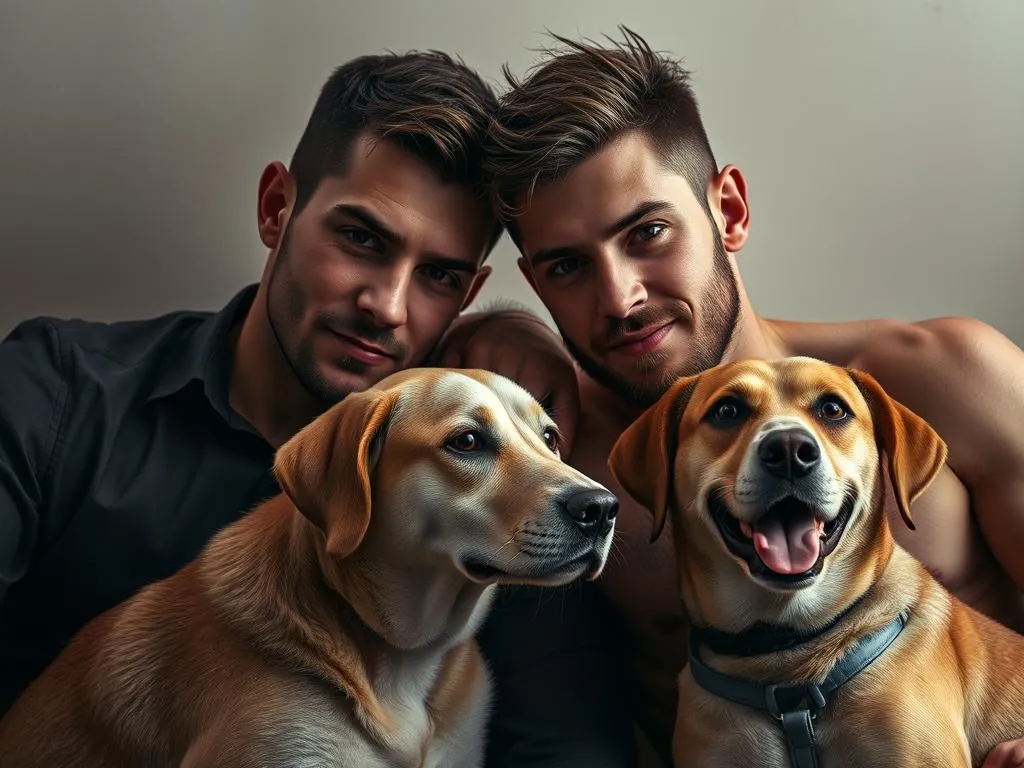
Introduction
The bond between gay men and dogs is a unique and profound relationship that goes beyond mere companionship. Many gay men find emotional solace and social fulfillment through their canine companions, creating a lifestyle enriched with joy, love, and shared experiences. This article delves into the multifaceted connections between gay men and their dogs, exploring emotional support, social integration, and the values that unite them.
Pet ownership statistics reveal interesting trends within the LGBTQ+ community. Research indicates that LGBTQ+ individuals are more likely to own pets compared to their heterosexual counterparts. According to a survey by the American Pet Products Association, nearly 60% of LGBTQ+ households include at least one pet, showcasing the importance of animals in these communities. This article will cover everything from choosing the right dog to building a dog-friendly lifestyle, emphasizing the powerful role dogs play in the lives of gay men.
The Unique Connection Between Gay Men and Dogs
Emotional Support
Dogs offer unparalleled emotional support, making them invaluable companions for many gay men. They provide unconditional love, which can be particularly important for individuals who may have faced challenges in their lives, whether related to acceptance, relationships, or mental health.
Consider the story of Mark, a gay man from San Francisco, who adopted a rescue dog named Buddy. After a difficult breakup, Mark found himself feeling isolated and lonely. However, Buddy’s playful antics and affectionate nature brought joy back into his life, helping him heal emotionally. “Having Buddy around has made me feel less alone,” Mark shared. “He’s not just a pet; he’s my best friend.”
Social Integration
The presence of dogs can significantly enhance social interactions. For gay men, dogs often serve as a bridge to meet new people and foster connections within the community. Dog parks, pet-friendly events, and LGBTQ+ pet groups create spaces where like-minded individuals can gather and bond over their shared love for animals.
Events such as Pride parades often feature dog-friendly activities, allowing gay men to celebrate their identities alongside their furry friends. These gatherings foster a sense of belonging and community, proving that the love for dogs transcends boundaries and brings people together.
Shared Values
The values that come with dog ownership—loyalty, love, and care—resonate deeply with many gay men. Just as a dog is a loyal companion, many gay men value loyalty in their relationships and friendships. The mutual care involved in dog ownership mirrors the nurturing relationships within the LGBTQ+ community, where support and acceptance are paramount.
Choosing the Right Dog
Lifestyle Considerations
When it comes to selecting a dog, assessing individual lifestyles is crucial. Factors such as activity level, living situation, and work schedules all play a role in the decision-making process. Some gay men may lead active lifestyles, while others may prefer a more relaxed atmosphere. Understanding these preferences can help in choosing the right breed.
For instance, those who enjoy outdoor activities may thrive with a high-energy breed, while individuals living in apartments might need a smaller, lower-energy dog.
Breed Recommendations
Here are some dog breeds that often align well with the lifestyles of gay men:
- Active Breeds:
- Labrador Retriever: Friendly and energetic, perfect for those who love outdoor adventures.
-
Australian Shepherd: Highly intelligent and active, suited for those who enjoy exercise and training.
-
Smaller Breeds for Apartment Living:
- French Bulldog: Playful and affectionate, ideal for city dwellers.
-
Dachshund: Compact and charming, fits well in smaller spaces.
-
Hypoallergenic Options:
- Poodle: Available in various sizes, they are intelligent and low-shedding.
- Maltese: Small and gentle, they are great for those with allergies.
Adoption vs. Buying
Deciding whether to adopt a dog from a shelter or buy from a breeder is a significant consideration. Adoption often provides a loving home to a dog in need, while purchasing from a breeder may offer specific breeds or characteristics.
Both options have their pros and cons. Adoption can be cost-effective, and many shelters are LGBTQ+-friendly, providing a welcoming environment for potential pet owners. On the other hand, breeders can provide health guarantees and specific breed traits.
Ultimately, the choice should align with an individual’s values and circumstances.
The Benefits of Owning a Dog
Health and Well-being
Owning a dog comes with numerous health benefits, both physical and mental. Regular walks and playtime promote exercise, helping to maintain a healthy lifestyle. Additionally, studies have shown that interacting with dogs can lower stress levels and reduce anxiety, benefiting mental health.
The simple act of petting a dog has been shown to release oxytocin, the “love hormone,” which fosters feelings of happiness and reduces cortisol, the stress hormone. For many gay men, having a dog can provide a sense of calm and stability amidst life’s challenges.
Companionship and Loneliness
For individuals who may experience loneliness or isolation, dogs serve as perfect companions. The routine of caring for a dog can bring structure to one’s day and alleviate feelings of loneliness.
Dogs are particularly adept at providing companionship during difficult times, reminding their owners that they are never truly alone. The bond formed through shared experiences—whether it’s going for walks, playing fetch, or simply cuddling on the couch—creates a profound connection that enriches life.
Responsibility and Routine
Caring for a dog instills a sense of responsibility that can positively impact overall quality of life. The daily routine of feeding, walking, and grooming a dog fosters discipline and structure.
For gay men who may lead busy lives, having a dog encourages them to carve out time for leisure and self-care. This routine not only benefits the dog but also contributes to the owner’s well-being, creating a fulfilling lifestyle.
Building a Dog-Friendly Lifestyle
Traveling with Dogs
Traveling with dogs can be an enriching experience, allowing gay men to explore new destinations together. Many hotels and accommodations now cater to pet owners, offering dog-friendly amenities and services.
When planning a trip, consider destinations known for their pet-friendly environments. Beach towns, national parks, and cities with dog-friendly attractions can provide memorable experiences for both owner and dog.
Pet Care and Grooming
Regular vet visits, grooming, and proper care are essential for maintaining a dog’s health. Establishing a relationship with a local veterinarian ensures that your dog receives the necessary vaccinations, check-ups, and preventative care.
Additionally, grooming is vital, particularly for certain breeds that require regular maintenance. Finding local grooming services or learning to groom at home can enhance the bond between dog and owner.
Community Engagement
Participation in local LGBTQ+ pet events, charity runs, and community gatherings can enhance the dog-owning experience. Engaging with other dog owners fosters connections and builds friendships within the community.
Consider joining local LGBTQ+ pet groups on social media or participating in events that celebrate both pet ownership and the LGBTQ+ community. These activities create opportunities for socialization, networking, and shared experiences that enrich life.
Challenges and Considerations
Discrimination and Stigma
While the bond between gay men and dogs is often positive, some may face challenges related to discrimination or stigma. Whether it’s in housing situations or public spaces, gay men may encounter biases that affect their ability to own pets.
It’s essential to advocate for inclusive environments that recognize the value of diversity in pet ownership. Building awareness within the community can help combat these challenges.
Financial Responsibilities
Owning a dog comes with financial commitments, including food, vet bills, grooming, and other expenses. It’s important to budget appropriately to ensure that financial responsibilities do not become overwhelming.
Potential pet owners should assess their financial situation and consider the ongoing costs associated with dog ownership. This foresight can prevent stress and ensure a happy life for both the owner and the pet.
Time Commitment
Training, socialization, and care for dogs require a significant time commitment. It’s vital for potential dog owners to evaluate their schedules and determine if they can dedicate the necessary time to their canine companions.
Investing time in training and socialization not only benefits the dog but also strengthens the bond between owner and pet. Understanding this commitment is crucial for a fulfilling dog-owning experience.
Conclusion
The relationship between gay men and dogs is a vibrant and fulfilling aspect of life that brings joy, companionship, and community. From the emotional support dogs provide to the social connections they foster, the benefits of dog ownership are profound.
As you consider adding a dog to your life, reflect on the unique joys and responsibilities that come with this decision. Embracing this bond not only enhances your lifestyle but also contributes to the rich tapestry of the LGBTQ+ community.
We invite you to share your experiences and stories about being gay men and dog owners in the comments. Your insights can inspire others and foster a deeper understanding of the powerful connection between gay men and their dogs.









